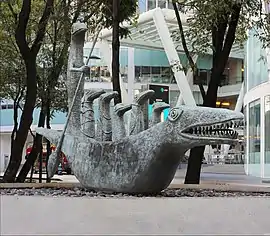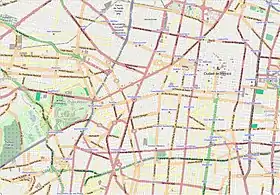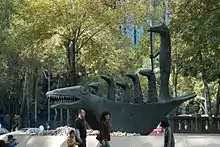| How Doth the Little Crocodile | |
|---|---|
| Spanish: Cómo hace el pequeño cocodrilo | |
 The sculpture in 2017 | |
 How Doth the Little Crocodile Location in Mexico City | |
| Artist | Leonora Carrington |
| Year | c. 1998 |
| Medium | Bronze |
| Movement | Surrealism |
| Subject | "How Doth the Little Crocodile" |
| Dimensions | 4.8 m × 8.5 m (16 ft × 28 ft) |
| Weight | 5 tonnes (4.9 long tons; 5.5 short tons) |
| Location | Mexico City, Mexico |
| 19°25′45″N 99°09′44″W / 19.42930°N 99.16227°W | |
How Doth the Little Crocodile (Spanish: Cómo hace el pequeño cocodrilo)[lower-alpha 1] is both a painting and an outdoor bronze sculpture by British-born Mexican surrealist artist Leonora Carrington.
Carrington first painted How Doth the Little Crocodile in 1998.[1] The statue was cast around that time and in 2000, it was donated to the government of Mexico City, who installed it in a pond at Chapultepec Park, in the Miguel Hidalgo borough. The sculpture was relocated in 2006 to Paseo de la Reforma Avenue, in the Cuauhtémoc borough, in downtown Mexico City.
Both artworks were inspired by and named after the 1865 poem "How Doth the Little Crocodile", written by Lewis Carroll for his novel Alice's Adventures in Wonderland.
History
Background and description
.jpg.webp)
Leonora Carrington (1917–2011) was a British surrealist artist who established in Mexico during the World War II era.[2] She mainly worked as a painter and it was not until 1994 that she started to sculpt, after the insistence of Isaac Masri, a Mexican art promoter. In one year, she had sculpted eight works. Carrington and Masri included them in the exhibition "Freedom in Bronze 2000".[3]
In 1998, Carrington painted How Doth the Little Crocodile (Spanish: Cómo hace el pequeño cocodrilo), which features five small crocodiles sailing on a large crocodile boat that is being propelled with a paddle by another crocodile.[3] How Doth the Little Crocodile was based on and named after "How Doth the Little Crocodile", an 1865 poem written by Lewis Carroll for his novel Alice's Adventures in Wonderland.[4]
Carrington presented Masri with a representation of How Doth the Little Crocodile, which Masri recalled was "done completely in paper wrapped in cloth",[3] and he added:
Curiously [...] after we finished 'Freedom in Bronze' and the exhibition was still on, Leonora called me and invited me for a drink [... At her home], she opened the door to a room I had never been in and I was facing the piece called Crocodile [...] I became very excited because I had not expected it. The first thing that came into my mind was, 'This has to be in water.' Leonora said, 'Take it to the foundry,' which is exactly what I did and she was delighted with the result.[3]
The bronze sculpture of How Doth the Little Crocodile is 8.5 metres (28 ft) long and 4.8 metres (16 ft) high, and weighs 5 tonnes (4.9 long tons; 5.5 short tons).[3]
Installation and relocation

After the sculpture was cast, she donated it to the government of Mexico City. Masri insisted it had to stand on the water as the work depicts aquatic animals in an aquatic setup. Cuauhtémoc Cárdenas, then-head of government, decided to pay homage to Carrington and her contributions to the city, who accepted it as long as it was a small event. The selected space was in the middle of a pond at the second section of Chapultepec Park, formerly occupied by a fountain whose systems were never plugged. The government remodelled the area, erased the graffiti in the zone and it was illuminated. How Doth the Little Crocodile was placed in March 2000 in a ceremony where Carrington was recognised as "Woman of Distinction" by the city.[3]
According to Masri, one day Carrington visited Crocodile and noticed that several parked trucks were obstructing the view. Carrington herself proposed a relocation site as the sculpture could be more in touch with the public.[5] In March 2006, the sculpture was relocated to a fountain in the corner of Havre Street and Paseo de la Reforma Avenue,[6] next to Reforma 222.[7]
Impact
The painting was featured as a Google Doodle on 6 April 2015.[4][8]
Notes
References
- 1 2 Abelleyra, Angélica. "Leonora Carrington: La rebeldía como sello" [Leonora Carrington: Rebellion as seal] (in Spanish). Museo de Mujeres Artistas. Archived from the original on 23 November 2020. Retrieved 5 June 2021.
- ↑ Bain, Miranda (31 August 2015). "Biography: Leonora Carrington – Artist and writer". The Heroine Collective. Archived from the original on 28 February 2020. Retrieved 3 June 2021.
- 1 2 3 4 5 6 MacMasters, Merry (October–December 2020). "Leonora Carrington and Sculpture" (PDF). Voices of Mexico. Mexico City: Centro de Investigaciones sobre América del Norte. pp. 41–47. Archived (PDF) from the original on 5 June 2021. Retrieved 3 June 2021.
- 1 2 Gibbs, Johnatan (6 April 2015). "Painter's Birthday Honoured With A Google Doodle". The Independent. Archived from the original on 22 January 2021. Retrieved 5 June 2021.
- ↑ MacMasters, Merry (17 March 2006). "En espectacular recorrido reubicarán el Cocodrilo de Leonora Carrington" [In spectacular tour, Crocodile by Leonora Carrington to be relocated]. La Jornada (in Spanish). Archived from the original on 9 June 2021. Retrieved 9 June 2021.
- ↑ Jiménez, Arturo (19 March 2006). "Cocodrilo, de Leonora Carrington, posa en su nuevo lecho de agua sobre Reforma" [Crocodile, by Leonora Carrington, poses in its new water bed on Reforma]. La Jornada (in Spanish). Archived from the original on 6 November 2018. Retrieved 23 November 2018.
- ↑ León, Stephanie (6 April 2016). "5 obras de Leonora Carrington en la CDMX" [5 works by Leonora Carrington in Mexico City]. máspormás (in Spanish). Retrieved 5 December 2021.
- ↑ "'Cocodrilo' navega el espacio por aniversario de Leonora Carrington" ['Crocodile' navigates the space for Leonora Carrington's anniversary]. SDP Noticias (in Spanish). 6 April 2015. Archived from the original on 31 July 2020. Retrieved 23 November 2018.
External links
 Media related to Cocodrilo by Leonora Carrington at Wikimedia Commons
Media related to Cocodrilo by Leonora Carrington at Wikimedia Commons- "Leonora Carrington en la CDMX" [Leonora Carrington in CDMX] (in Spanish). Government of Mexico City.
- Moorhead, Joana (31 May 2021). "Is that a surrealist masterpiece by the draining board? Inside Leonora Carrington's sculpture-filled home". The Guardian.
- "Cocodrilo de Leonora Carrington" [Crocodile by Leonora Carrington]. Atlas Obscura.